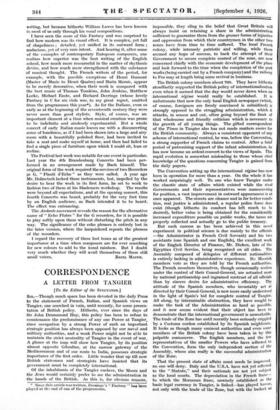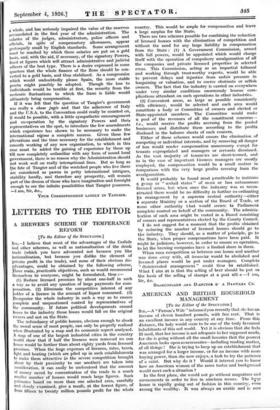CORRESPONDENCE
A LETTER FROM TANGIER
[To the Editor of the SPECTATOR.] SIR,—Though much space has been devoted in the daily Press to the statement of French, Italian, and Spanish views on Tangier, one searched in vain, until recently, for some presen- tation of British policy. Hitherto, ever since the days of Sir John Drtmunond Hay, this policy has been to refuse to countenance the predominance of any one Power at Tangier, since occupation by a strong Power of such an important strategic position has always been opposed by our naval and military authorities, and a weak Power might not be able to maintain the strict neutrality of Tangier in the event of war. A glance at the map will show how Tangier, by its position almost opposite Gibraltar, at the narrow gateway of the Mediterranean and of our route to India, possesses strategic importance of the first order. Little wonder that up till now. British statesmen and strategists have insisted that its government must be completely international.
Of the inhabitants of the Tangier enclave, the Moors and the Jews would certainly prefer to see the administration in the hands of the British. As this is, for obvious reasons, s Since this article was written, Deer:Inge 's "Fantasy " has been played at th3 end of one of the programmes. impossible, they cling to the belief that Great Britain will always insist on retaining a share in the administration sufficient to guarantee them from the grosser forms of injustice
and oppression from which their countrymen in the other two zones have from time to time suffered. The local French colony, while intensely patriotic and willing, while there
seemed any hope of success, to back the attempt of their GOvemment to 'secure complete control of the zone, are now
concerned chiefly with the economic development of the place and look forward to the time when the completion of the port works (being carried out by a French company) and the railway to Fez may at length bring some revival in business.
The British colony numbers about 700. They have hitherto steadfastly supported the British policy of internationalization
even when it seemed that the day would never dawn when an • international regime would really be established. It is unfortunate that now the only local English newspaper (which,
of • course, foreigners are firmly convinced is subsidized) is strongly opposed to the struggling administration, which it attacks, in season and out, often going beyond the limit of that wholesome and friendly criticism which is necessary to
the growth of all young things. The gifted correspondent of the Times in Tangier also has not made matters easier for
the British community. Always a consistent opponent of any scheme of international control, he was, before the Convention, a strong supporter of French claims to control. After a brief period of patronizing support of the infant administration, he has now become an ardent convert to the views of Spain. This rapid evolution is somewhat misleading to those whose chief knowledge of the questions concerning Tangier is gained from the daily papers.
The Convention setting up the international regime has now been in operation for more than a year. On the whole it has
worked surprisingly well. To one who knew Tangier under the chaotic state of affairs which existed while the rival Governments and their representatives were manoeuvring
for position, a vast improvement in outward appearances is at
once apparent. The streets are cleaner and in far better condi. tion, real justice is administered, a regular police force does exist (though hitherto its conduct has left much to be desired), better value is being obtained for the considerably increased expenditure possible on public works, the taxes are properly collected and actually go to the public treasury.
But such success as has been achieved in this novel experiment in political science is due mainly to the officials —the Administrator (a French Civil Servant) and his two assistants (one Spanish and one English), the excellent work of the English Director of Finance, Mr. Dicke'', late of the Egyptian Civil Service, being recognized on all sides. The
Assembly composed of delegates of different nationalities• is entirely lacking in administrative experience. Its Moorish
members vote as they are told by the French authorities.
The French members themselves, though occasionally restive under the control of their Consul-General, are actuated more by national partisanship and ingrained mistrust of all officials than by sincere desire for administrative efficiency. The attitude of the Spanish members, who invariably act as directed by their Consul-General, is now more easily understood in the light of Spain's bid for" complete control of Tangier. All along, by interminable obstruction, they have sought to make the task of the Administration as hard as possible, and it now seems evident that their object has been to demonstrate that the international government is unworkable. The trade of the Zone has until recently been seriously crippled by a Customs cordon established by its Spanish neighbours. It looks as though many eminent authorities and even some members of the British _colony have been taken in by this palpable manoeuvre. - The English members, and the few representatives of the smaller Powers who have adhered to the Convention, form the only independent section of the Assembly, whose aim really is the successful administration of the Zone.
That the present state of affairs must needs be bnproved, no one will deny. Italy and. the U.S.A. have not yet adhered to the "Statute," and their nationals are not yet subject to the local courts. The depreciation in the French franc to which the Moroccan franc, unwisely established as the basic legal currency in Tangier, is linked—has played havoc, not only with the trade of the Zone, but with the budget 85 a whole, and has seriously impaired the value of the reserves accumulated in the first year of the administration. The salaries of the judges, administrators, police officers and officials, in spite of compensatory allowances, appear grotesquely small by English standards. Some arrangement must be reached by which these salaries are put on a gold basis, and, with the aid, if necessary, of the signatory Powers, fixed at figures which will attract administrative and judicial officers of the best type. There is a desire expressed in some quarters that the whole finance of the Zone should be con- verted to a gold basis, and thus stabilized. As a compromise which would undoubtedly please Spain, the more stable peseta might possibly be adopted. Though the loss to individuals would be terrible at first, the security from the meteoric fluctuations to which the franc is liable would ultimately bring compensation.
If it was felt that the question of Tangier's government was really a chose jug& and that the adherence of Italy and the U.S.A. to the Convention could really be counted on, it would be possible, with a little sympathetic encouragement and co-operation by the signatory Powers and their representatives on the spot, to introduce the few amendments which experience has shown to be necessary to make the international regime a complete success. Given these few alterations and the time necessary for the establishment and smooth working of any new organization, to which in this case must be added the gaining of experience by those up till now completely unfamiliar with any form of sound local government, there is no reason why the Administration should not work well on really international lines. But as long as he fate of Tangier and of the wretched people who live there are considered as pawns in petty international intrigues, stability locally, and therefore any prosperity, will remain part of the dream of those who have imagination and foresight enough to see the infinite possibilities that Tangier possesses. —I am, Sir, &c.,
?OUR CORRESPONDENT LATELY IN TANGIER.



































 Previous page
Previous page